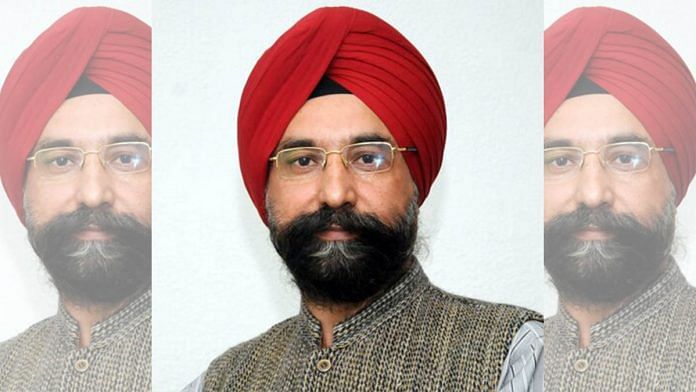New Delhi: The three contentious farm laws passed by the Narendra Modi government last year could help farmers get their due, but the government faltered in its communication about them, said Dr Rupinder Singh Sodhi, managing director of Amul.
In a virtual Off the Cuff interaction with ThePrint’s Editor-in-Chief Shekhar Gupta Thursday, Sodhi added that if the government repeals the new farm laws now, it will set a bad precedent.
“The intentions are good, but the detailing hasn’t been done properly,” said Sodhi, referring to the three laws, adding, “If they (the government) step back, you will have to see the consequences. It may set a very bad precedent.”
Farmers from Punjab, Haryana, and Uttar Pradesh have been protesting at Delhi’s borders against the three farm laws passed in September last year.
Despite multiple talks with the central government, which has proposed several amendments, the farmers haven’t relented in their protests and continue demanding a repeal of all the laws.
Also read: ‘Will stand with farmers & Punjab’ — farmer leader Bhupinder Mann quits SC farm laws panel
A failure in communication
Sodhi argued that the government failed in its communication with the farmers, whose protest is an “outburst” after decades of neglect and exploitation.
“What you’ll see today is basically the outburst of the farmers, because right from the last 70 years after Independence, farmers have not got their due share of economic prosperity in India. In the last decade, politicians, policymakers, the bureaucracy, and even the media — no one has given importance to farmers’ prosperity,” he said.
Sodhi added: “The government has not been able to communicate the benefit of these laws, and the farmers haven’t liked it.”
This lack of communication, Sodhi said, has put the government in a “tricky situation,” and they must “now weigh both sides.”
However, the one good thing that has emerged from the protests, he observed, was that the importance of farmers was being recognised.
“Everybody has recognised the importance and power of farmers. In the future, every policymaker has to keep in mind that farmers cannot be taken for granted,” he said.
According to Sodhi, efficiency in farming won’t come from big mechanised farms that are controlled by a few because the scale of farming in the country is too wide, and it would snatch away farmers’ livelihoods.
“In India, mechanised farming is not possible. The reason is simple: 100-150 million families are dependent on farming. India is at the mercy of small farms. If you make big farms, what will we do with 150 million families? How will we provide for their livelihoods? That area needs to be solved first.”
Also read: Farmers mark sombre ‘kaali Lohri’ at Delhi’s borders, burn copies of farm laws
Changing farm practices
Sodhi also listed out farm practices that can be altered to allow maximum output.
He said that farmers in the green revolution zones of Punjab and Haryana must diversify and interact more directly with free markets to get out of the “crutches” of subsidies. The government, for its part, should “let demand and supply play,” and not interfere too much in pricing.
“From the green revolution time, you (states) continue to spend (Rs) 75,000 crore on fertiliser subsidy, power subsidy, seed subsidy, property loans and no income tax. So you aren’t looking at new avenues. Naturally I (farmers) am getting free power, MSP, ample water, subsided fertiliser, subsidised seeds, property loans — why should I look into other areas?”
But diversifying is key, Sodhi noted, to farmers gaining from differing market conditions. He said it was not right for farmers to go on producing crops for which there is no demand, simply because the government is a guaranteed buyer.
“India is self sufficient in food except for two-three categories where we are importing. One is edible oil, of some Rs 75,000 crore, and another is pulses. So one has to see how that diversification of crop happens. MSP is good, but you have to see that you give more MSP in crops and executed also like in edible oils and seasonal pulses,” said Sodhi, adding, “We have to see that farmers are encouraged to produce more, at whatever cost, but remunerated through demand and supply.”
Another area of growth is animal husbandry, which has a growth rate of 14 per cent because Indians are shifting to more protein-based diets, Sodhi said.
Amul and milk production
On the growth of Amul, which is currently the eighth largest producer of milk in the world, Sodhi said the company had “taken up the challenge” of becoming the third-largest milk producer by 2022 — a goal set by Prime Minister Narenda Modi.
“We have taken the challenge. We are growing at a rate of 8 to 9 per cent, while the top companies are not growing. We will definitely achieve it,” he said.
Also read: Easy money, cycle of debt — why Punjab’s farmers can’t get out of the clutches of arhatiyas




What a genius sir jee. As he says the first thing to do is decide what to do with 150 million farmers and make it 600 million with their families. Total genius sir jee. He must help provide an answer also as to what to do with 600 million people. They could all move into the milk business (and feed the non milking cattle for the rest of their lives) ? Or they could all grow brocolli / strawberrys / asparagus / and so many exotic vegetable which all Indians consume in large quantities. Opportunities abound.